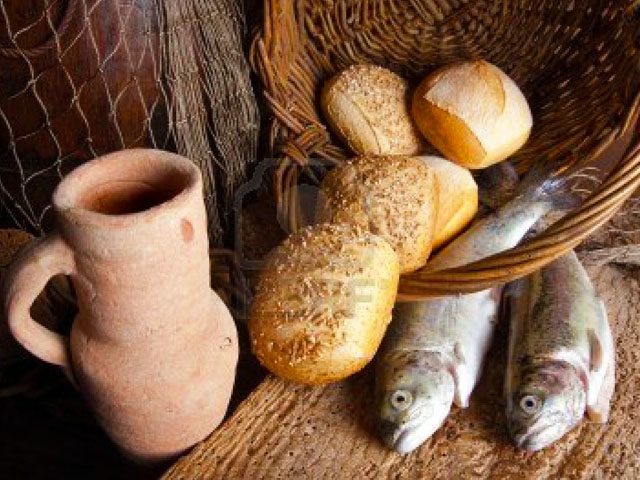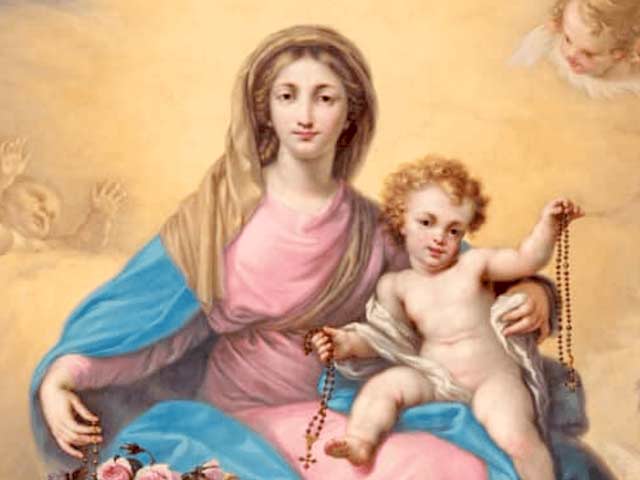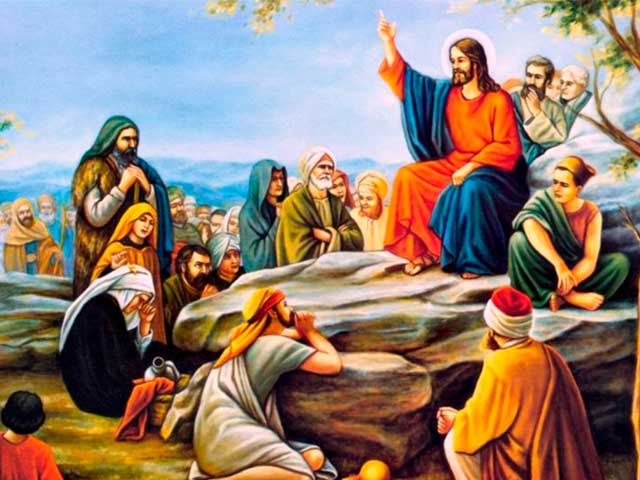Daily Readings Audio | January 10, 2022 – January 16, 2022

Monday of the First Week in Ordinary Time
Lectionary: 305
Reading I
There was a certain man from Ramathaim, Elkanah by name,
a Zuphite from the hill country of Ephraim.
He was the son of Jeroham, son of Elihu,
son of Tohu, son of Zuph, an Ephraimite.
He had two wives, one named Hannah, the other Peninnah;
Peninnah had children, but Hannah was childless.
This man regularly went on pilgrimage from his city
to worship the LORD of hosts and to sacrifice to him at Shiloh,
where the two sons of Eli, Hophni and Phinehas,
were ministering as priests of the LORD.
When the day came for Elkanah to offer sacrifice,
he used to give a portion each to his wife Peninnah
and to all her sons and daughters,
but a double portion to Hannah because he loved her,
though the LORD had made her barren.
Her rival, to upset her, turned it into a constant reproach to her
that the LORD had left her barren.
This went on year after year;
each time they made their pilgrimage to the sanctuary of the LORD,
Peninnah would approach her,
and Hannah would weep and refuse to eat.
Her husband Elkanah used to ask her:
“Hannah, why do you weep, and why do you refuse to eat?
Why do you grieve?
Am I not more to you than ten sons?”
Responsorial Psalm
R. (17a) To you, Lord, I will offer a sacrifice of praise.
or:
R. Alleluia.
How shall I make a return to the LORD
for all the good he has done for me?
The cup of salvation I will take up,
and I will call upon the name of the LORD.
R. To you, Lord, I will offer a sacrifice of praise.
or:
R. Alleluia.
My vows to the LORD I will pay
in the presence of all his people.
Precious in the eyes of the LORD
is the death of his faithful ones.
O LORD, I am your servant;
I am your servant, the son of your handmaid;
you have loosed my bonds.
R. To you, Lord, I will offer a sacrifice of praise.
or:
R. Alleluia.
My vows to the LORD I will pay
in the presence of all his people,
In the courts of the house of the LORD,
in your midst, O Jerusalem.
R. To you, Lord, I will offer a sacrifice of praise.
or:
R. Alleluia.
Alleluia
R. Alleluia, alleluia.
The Kingdom of God is at hand;
repent and believe in the Gospel.
R. Alleluia, alleluia.
Gospel
After John had been arrested,
Jesus came to Galilee proclaiming the Gospel of God:
“This is the time of fulfillment.
The Kingdom of God is at hand.
Repent, and believe in the Gospel.”
As he passed by the Sea of Galilee,
he saw Simon and his brother Andrew casting their nets into the sea;
they were fishermen.
Jesus said to them,
“Come after me, and I will make you fishers of men.”
Then they left their nets and followed him.
He walked along a little farther
and saw James, the son of Zebedee, and his brother John.
They too were in a boat mending their nets.
Then he called them.
So they left their father Zebedee in the boat
along with the hired men and followed him.
Tuesday of the First Week in Ordinary Time
Lectionary: 306
Reading I
Hannah rose after a meal at Shiloh,
and presented herself before the LORD;
at the time, Eli the priest was sitting on a chair
near the doorpost of the LORD’s temple.
In her bitterness she prayed to the LORD, weeping copiously,
and she made a vow, promising: “O LORD of hosts,
if you look with pity on the misery of your handmaid,
if you remember me and do not forget me,
if you give your handmaid a male child,
I will give him to the LORD for as long as he lives;
neither wine nor liquor shall he drink,
and no razor shall ever touch his head.”
As she remained long at prayer before the LORD,
Eli watched her mouth, for Hannah was praying silently;
though her lips were moving, her voice could not be heard.
Eli, thinking her drunk, said to her,
“How long will you make a drunken show of yourself?
Sober up from your wine!”
“It isn’t that, my lord,” Hannah answered.
“I am an unhappy woman.
I have had neither wine nor liquor;
I was only pouring out my troubles to the LORD.
Do not think your handmaid a ne’er-do-well;
my prayer has been prompted by my deep sorrow and misery.”
Eli said, “Go in peace,
and may the God of Israel grant you what you have asked of him.”
She replied, “Think kindly of your maidservant,” and left.
She went to her quarters, ate and drank with her husband,
and no longer appeared downcast.
Early the next morning they worshiped before the LORD,
and then returned to their home in Ramah.
When Elkanah had relations with his wife Hannah,
the LORD remembered her.
She conceived, and at the end of her term bore a son
whom she called Samuel, since she had asked the LORD for him.
Responsorial Psalm
R. (see 1) My heart exults in the Lord, my Savior.
“My heart exults in the LORD,
my horn is exalted in my God.
I have swallowed up my enemies;
I rejoice in my victory.”
R. My heart exults in the Lord, my Savior.
“The bows of the mighty are broken,
while the tottering gird on strength.
The well-fed hire themselves out for bread,
while the hungry batten on spoil.
The barren wife bears seven sons,
while the mother of many languishes.”
R. My heart exults in the Lord, my Savior.
“The LORD puts to death and gives life;
he casts down to the nether world;
he raises up again.
The LORD makes poor and makes rich;
he humbles, he also exalts.”
R. My heart exults in the Lord, my Savior.
“He raises the needy from the dust;
from the dung heap he lifts up the poor,
To seat them with nobles
and make a glorious throne their heritage.”
R. My heart exults in the Lord, my Savior.
Alleluia
R. Alleluia, alleluia.
Receive the word of God, not as the word of men,
but as it truly is, the word of God.
R. Alleluia, alleluia.
Gospel
Jesus came to Capernaum with his followers,
and on the sabbath he entered the synagogue and taught.
The people were astonished at his teaching,
for he taught them as one having authority and not as the scribes.
In their synagogue was a man with an unclean spirit;
he cried out, “What have you to do with us, Jesus of Nazareth?
Have you come to destroy us?
I know who you are–the Holy One of God!”
Jesus rebuked him and said, “Quiet! Come out of him!”
The unclean spirit convulsed him and with a loud cry came out of him.
All were amazed and asked one another,
“What is this?
A new teaching with authority.
He commands even the unclean spirits and they obey him.”
His fame spread everywhere throughout the whole region of Galilee.
Wednesday of the First Week in Ordinary Time
Lectionary: 307
Reading I
During the time young Samuel was minister to the LORD under Eli,
a revelation of the LORD was uncommon and vision infrequent.
One day Eli was asleep in his usual place.
His eyes had lately grown so weak that he could not see.
The lamp of God was not yet extinguished,
and Samuel was sleeping in the temple of the LORD
where the ark of God was.
The LORD called to Samuel, who answered, “Here I am.”
Samuel ran to Eli and said, “Here I am. You called me.”
“I did not call you,” Eli said. “Go back to sleep.”
So he went back to sleep.
Again the LORD called Samuel, who rose and went to Eli.
“Here I am,” he said. “You called me.”
But Eli answered, “I did not call you, my son. Go back to sleep.”
At that time Samuel was not familiar with the LORD,
because the LORD had not revealed anything to him as yet.
The LORD called Samuel again, for the third time.
Getting up and going to Eli, he said, “Here I am.
You called me.”
Then Eli understood that the LORD was calling the youth.
So Eli said to Samuel, “Go to sleep, and if you are called, reply,
‘Speak, LORD, for your servant is listening.’”
When Samuel went to sleep in his place,
the LORD came and revealed his presence,
calling out as before, “Samuel, Samuel!”
Samuel answered, “Speak, for your servant is listening.”
Samuel grew up, and the LORD was with him,
not permitting any word of his to be without effect.
Thus all Israel from Dan to Beersheba
came to know that Samuel was an accredited prophet of the LORD.
Responsorial Psalm
R. (8a and 9a) Here am I, Lord; I come to do your will.
I have waited, waited for the LORD,
and he stooped toward me and heard my cry.
Blessed the man who makes the LORD his trust;
who turns not to idolatry
or to those who stray after falsehood.
R. Here am I, Lord; I come to do your will.
Sacrifice or oblation you wished not,
but ears open to obedience you gave me.
Burnt offerings or sin-offerings you sought not;
then said I, “Behold I come.”
R. Here am I, Lord; I come to do your will.
“In the written scroll it is prescribed for me.
To do your will, O my God, is my delight,
and your law is within my heart!”
R. Here am I, Lord; I come to do your will.
I announced your justice in the vast assembly;
I did not restrain my lips, as you, O LORD, know.
R. Here am I, Lord; I come to do your will.
Alleluia
R. Alleluia, alleluia.
My sheep hear my voice, says the Lord.
I know them, and they follow me.
R. Alleluia, alleluia.
Gospel
On leaving the synagogue
Jesus entered the house of Simon and Andrew with James and John.
Simon’s mother-in-law lay sick with a fever.
They immediately told him about her.
He approached, grasped her hand, and helped her up.
Then the fever left her and she waited on them.
When it was evening, after sunset,
they brought to him all who were ill or possessed by demons.
The whole town was gathered at the door.
He cured many who were sick with various diseases,
and he drove out many demons,
not permitting them to speak because they knew him.
Rising very early before dawn,
he left and went off to a deserted place, where he prayed.
Simon and those who were with him pursued him
and on finding him said, “Everyone is looking for you.”
He told them, “Let us go on to the nearby villages
that I may preach there also.
For this purpose have I come.”
So he went into their synagogues, preaching and driving out demons
throughout the whole of Galilee.
Thursday of the First Week in Ordinary Time
Lectionary: 308
Reading I
The Philistines gathered for an attack on Israel.
Israel went out to engage them in battle and camped at Ebenezer,
while the Philistines camped at Aphek.
The Philistines then drew up in battle formation against Israel.
After a fierce struggle Israel was defeated by the Philistines,
who slew about four thousand men on the battlefield.
When the troops retired to the camp, the elders of Israel said
“Why has the LORD permitted us to be defeated today
by the Philistines?
Let us fetch the ark of the Lord from Shiloh
that it may go into battle among us
and save us from the grasp of our enemies.”
So the people sent to Shiloh and brought from there
the ark of the LORD of hosts, who is enthroned upon the cherubim.
The two sons of Eli, Hophni and Phinehas, were with the ark of God.
When the ark of the LORD arrived in the camp,
all Israel shouted so loudly that the earth resounded.
The Philistines, hearing the noise of shouting, asked,
“What can this loud shouting in the camp of the Hebrews mean?”
On learning that the ark of the LORD had come into the camp,
the Philistines were frightened.
They said, “Gods have come to their camp.”
They said also, “Woe to us! This has never happened before. Woe to us!
Who can deliver us from the power of these mighty gods?
These are the gods that struck the Egyptians
with various plagues and with pestilence.
Take courage and be manly, Philistines;
otherwise you will become slaves to the Hebrews,
as they were your slaves.
So fight manfully!”
The Philistines fought and Israel was defeated;
every man fled to his own tent.
It was a disastrous defeat,
.in which Israel lost thirty thousand foot soldiers.
The ark of God was captured,
and Eli’s two sons, Hophni and Phinehas, were among the dead.
Responsorial Psalm
R. (27b) Redeem us, Lord, because of your mercy.
Yet now you have cast us off and put us in disgrace,
and you go not forth with our armies.
You have let us be driven back by our foes;
those who hated us plundered us at will.
R. Redeem us, Lord, because of your mercy.
You made us the reproach of our neighbors,
the mockery and the scorn of those around us.
You made us a byword among the nations,
a laughingstock among the peoples.
R. Redeem us, Lord, because of your mercy.
Why do you hide your face,
forgetting our woe and our oppression?
For our souls are bowed down to the dust,
our bodies are pressed to the earth.
R. Redeem us, Lord, because of your mercy.
Alleluia
R. Alleluia, alleluia.
Jesus preached the Gospel of the Kingdom
and cured every disease among the people.
R. Alleluia, alleluia.
Gospel
A leper came to him and kneeling down begged him and said,
“If you wish, you can make me clean.”
Moved with pity, he stretched out his hand,
touched the leper, and said to him,
“I do will it. Be made clean.”
The leprosy left him immediately, and he was made clean.
Then, warning him sternly, he dismissed him at once.
Then he said to him, “See that you tell no one anything,
but go, show yourself to the priest
and offer for your cleansing what Moses prescribed;
that will be proof for them.”
The man went away and began to publicize the whole matter.
He spread the report abroad
so that it was impossible for Jesus to enter a town openly.
He remained outside in deserted places,
and people kept coming to him from everywhere.

- Readings for the Optional Memorial of Saint Hilary, bishop and doctor of the Church
Friday of the First Week in Ordinary Time
Lectionary: 309
Reading I
All the elders of Israel came in a body to Samuel at Ramah
and said to him, “Now that you are old,
and your sons do not follow your example,
appoint a king over us, as other nations have, to judge us.”
Samuel was displeased when they asked for a king to judge them.
He prayed to the LORD, however, who said in answer:
“Grant the people’s every request.
It is not you they reject, they are rejecting me as their king.”
Samuel delivered the message of the LORD in full
to those who were asking him for a king.
He told them:
“The rights of the king who will rule you will be as follows:
He will take your sons and assign them to his chariots and horses,
and they will run before his chariot.
He will also appoint from among them his commanders of groups
of a thousand and of a hundred soldiers.
He will set them to do his plowing and his harvesting,
and to make his implements of war and the equipment of his chariots.
He will use your daughters as ointment makers, as cooks, and as bakers.
He will take the best of your fields, vineyards, and olive groves,
and give them to his officials.
He will tithe your crops and your vineyards,
and give the revenue to his eunuchs and his slaves.
He will take your male and female servants,
as well as your best oxen and your asses,
and use them to do his work.
He will tithe your flocks and you yourselves will become his slaves.
When this takes place,
you will complain against the king whom you have chosen,
but on that day the LORD will not answer you.”
The people, however, refused to listen to Samuel’s warning and said,
“Not so! There must be a king over us.
We too must be like other nations,
with a king to rule us and to lead us in warfare
and fight our battles.”
When Samuel had listened to all the people had to say,
he repeated it to the LORD, who then said to him,
“Grant their request and appoint a king to rule them.”
Responsorial Psalm
R. (2) For ever I will sing the goodness of the Lord.
Blessed the people who know the joyful shout;
in the light of your countenance, O LORD, they walk.
At your name they rejoice all the day,
and through your justice they are exalted.
R. For ever I will sing the goodness of the Lord.
For you are the splendor of their strength,
and by your favor our horn is exalted.
For to the LORD belongs our shield,
and to the Holy One of Israel, our King.
R. For ever I will sing the goodness of the Lord.
Alleluia
R. Alleluia, alleluia.
A great prophet has arisen in our midst
and God has visited his people.
R. Alleluia, alleluia.
Gospel
When Jesus returned to Capernaum after some days,
it became known that he was at home.
Many gathered together so that there was no longer room for them,
not even around the door,
and he preached the word to them.
They came bringing to him a paralytic carried by four men.
Unable to get near Jesus because of the crowd,
they opened up the roof above him.
After they had broken through,
they let down the mat on which the paralytic was lying.
When Jesus saw their faith, he said to him,
“Child, your sins are forgiven.”
Now some of the scribes were sitting there asking themselves,
“Why does this man speak that way? He is blaspheming.
Who but God alone can forgive sins?”
Jesus immediately knew in his mind what
they were thinking to themselves,
so he said, “Why are you thinking such things in your hearts?
Which is easier, to say to the paralytic,
‘Your sins are forgiven,’
or to say, ‘Rise, pick up your mat and walk’?
But that you may know
that the Son of Man has authority to forgive sins on earth”
–he said to the paralytic,
“I say to you, rise, pick up your mat, and go home.”
He rose, picked up his mat at once,
and went away in the sight of everyone.
They were all astounded
and glorified God, saying, “We have never seen anything like this.”
Saturday of the First Week in Ordinary Time
Lectionary: 310
Reading I
There was a stalwart man from Benjamin named Kish,
who was the son of Abiel, son of Zeror,
son of Becorath, son of Aphiah, a Benjaminite.
He had a son named Saul, who was a handsome young man.
There was no other child of Israel more handsome than Saul;
he stood head and shoulders above the people.
Now the asses of Saul’s father, Kish, had wandered off.
Kish said to his son Saul, “Take one of the servants with you
and go out and hunt for the asses.”
Accordingly they went through the hill country of Ephraim,
and through the land of Shalishah.
Not finding them there,
they continued through the land of Shaalim without success.
They also went through the land of Benjamin,
but they failed to find the animals.
When Samuel caught sight of Saul, the LORD assured him,
“This is the man of whom I told you; he is to govern my people.”
Saul met Samuel in the gateway and said,
“Please tell me where the seer lives.”
Samuel answered Saul: “I am the seer.
Go up ahead of me to the high place and eat with me today.
In the morning, before dismissing you,
I will tell you whatever you wish.”
Then, from a flask he had with him, Samuel poured oil on Saul’s head;
he also kissed him, saying:
“The LORD anoints you commander over his heritage.
You are to govern the LORD’s people Israel,
and to save them from the grasp of their enemies roundabout.
“This will be the sign for you
that the LORD has anointed you commander over his heritage.”
Responsorial Psalm
R. (2a) Lord, in your strength the king is glad.
O LORD, in your strength the king is glad;
in your victory how greatly he rejoices!
You have granted him his heart’s desire;
you refused not the wish of his lips.
R. Lord, in your strength the king is glad.
For you welcomed him with goodly blessings,
you placed on his head a crown of pure gold.
He asked life of you: you gave him
length of days forever and ever.
R. Lord, in your strength the king is glad.
Great is his glory in your victory;
majesty and splendor you conferred upon him.
For you made him a blessing forever;
you gladdened him with the joy of your face.
R. Lord, in your strength the king is glad.
Alleluia
R. Alleluia, alleluia.
The Lord sent me to bring glad tidings to the poor
and to proclaim liberty to captives.
R. Alleluia, alleluia.
Gospel
Jesus went out along the sea.
All the crowd came to him and he taught them.
As he passed by, he saw Levi, son of Alphaeus,
sitting at the customs post.
Jesus said to him, “Follow me.”
And he got up and followed Jesus.
While he was at table in his house,
many tax collectors and sinners sat with Jesus and his disciples;
for there were many who followed him.
Some scribes who were Pharisees saw that Jesus was eating with sinners
and tax collectors and said to his disciples,
“Why does he eat with tax collectors and sinners?”
Jesus heard this and said to them,
“Those who are well do not need a physician, but the sick do.
I did not come to call the righteous but sinners.”
Second Sunday in Ordinary Time

Lectionary: 66
Reading I
For Zion’s sake I will not be silent,
for Jerusalem’s sake I will not be quiet,
until her vindication shines forth like the dawn
and her victory like a burning torch.
Nations shall behold your vindication,
and all the kings your glory;
you shall be called by a new name
pronounced by the mouth of the LORD.
You shall be a glorious crown in the hand of the LORD,
a royal diadem held by your God.
No more shall people call you “Forsaken, “
or your land “Desolate, “
but you shall be called “My Delight, “
and your land “Espoused.”
For the LORD delights in you
and makes your land his spouse.
As a young man marries a virgin,
your Builder shall marry you;
and as a bridegroom rejoices in his bride
so shall your God rejoice in you.
Responsorial Psalm
R. (3) Proclaim his marvelous deeds to all the nations.
Sing to the LORD a new song;
sing to the LORD, all you lands.
Sing to the LORD; bless his name.
R. Proclaim his marvelous deeds to all the nations.
Announce his salvation, day after day.
Tell his glory among the nations;
among all peoples, his wondrous deeds.
R. Proclaim his marvelous deeds to all the nations.
Give to the LORD, you families of nations,
give to the LORD glory and praise;
give to the LORD the glory due his name!
R. Proclaim his marvelous deeds to all the nations.
Worship the LORD in holy attire.
Tremble before him, all the earth;
Say among the nations: The LORD is king.
He governs the peoples with equity.
R. Proclaim his marvelous deeds to all the nations.
Reading II
Brothers and sisters:
There are different kinds of spiritual gifts but the same Spirit;
there are different forms of service but the same Lord;
there are different workings but the same God
who produces all of them in everyone.
To each individual the manifestation of the Spirit
is given for some benefit.
To one is given through the Spirit the expression of wisdom;
to another, the expression of knowledge according to the
same Spirit;
to another, faith by the same Spirit;
to another, gifts of healing by the one Spirit;
to another, mighty deeds;
to another, prophecy;
to another, discernment of spirits;
to another, varieties of tongues;
to another, interpretation of tongues.
But one and the same Spirit produces all of these,
distributing them individually to each person as he wishes.
Alleluia
R. Alleluia, alleluia.
God has called us through the Gospel
to possess the glory of our Lord Jesus Christ.
R. Alleluia, alleluia.
Gospel
There was a wedding at Cana in Galilee,
and the mother of Jesus was there.
Jesus and his disciples were also invited to the wedding.
When the wine ran short,
the mother of Jesus said to him,
“They have no wine.”
And Jesus said to her,
“Woman, how does your concern affect me?
My hour has not yet come.”
His mother said to the servers,
“Do whatever he tells you.”
Now there were six stone water jars there for Jewish ceremonial washings,
each holding twenty to thirty gallons.
Jesus told them,
“Fill the jars with water.”
So they filled them to the brim.
Then he told them,
“Draw some out now and take it to the headwaiter.”
So they took it.
And when the headwaiter tasted the water that had become wine,
without knowing where it came from
— although the servers who had drawn the water knew —,
the headwaiter called the bridegroom and said to him,
“Everyone serves good wine first,
and then when people have drunk freely, an inferior one;
but you have kept the good wine until now.”
Jesus did this as the beginning of his signs at Cana in Galilee
and so revealed his glory,
and his disciples began to believe in him.







